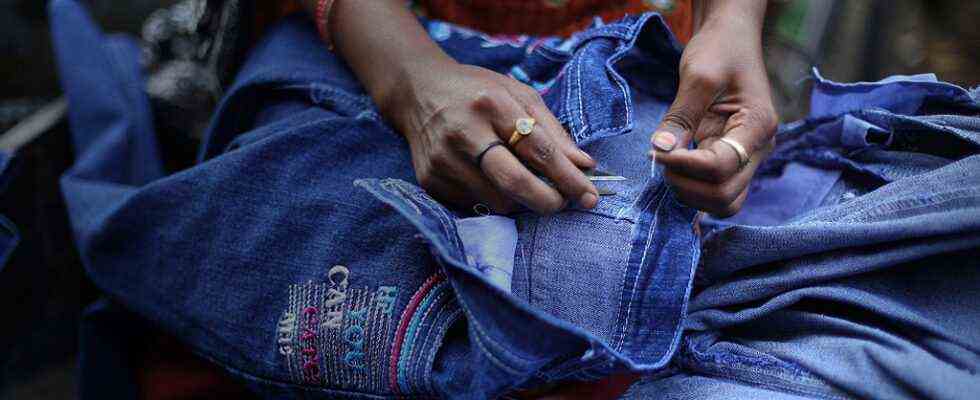Status: 09.12.2021 5:06 p.m.
Two Christian associations are leaving the “Alliance for Sustainable Textiles”. They complain that working conditions in the industry have barely improved since the Rana Plaza disaster seven years ago.
Conditions for workers in the East Asian textile industry have long been considered problematic. In order to improve it, around 130 companies, associations, trade unions, non-governmental organizations and the federal government have founded an “Alliance for Sustainable Textiles”. Now two members have left the alliance: Two Christian associations consider the textile alliance to have failed and have therefore turned their backs on it.
Living wages have not been achieved, the effects of the corona pandemic have simply been passed on to suppliers, and there is also a lack of transparency in supply chains: the list of points of criticism made by the Christian Initiative Romero eV (CIR) and the Office for Mission, Ecumenism and Global Church Responsibility of Evangelicals It is long to list the Church of Westphalia (MÖWe) as reasons for leaving. Relevant members such as H&M, Primark or Puma would still not have fulfilled their reporting obligations this year. The manufacturers wanted to respond to the request of tagesschau.de do not comment on this.
The alliance itself does not want to evaluate the exit and the reasons, said the head of the textile alliance secretariat Jürgen Janssen tagesschau.de. In the coming year, however, they will reposition themselves and adjust reporting requirements accordingly. The secretariat did not give any details.
More transparency as a goal
The alliance requires its members to campaign for living wages, reduced use of chemicals and the fight against corruption. The procedure has been mandatory since 2019, and other companies such as Humana or Edeka also left the alliance in response. Among other things, because of the progress reports, “26 companies have already left the textile alliance, which we expressly regret,” said the Textile and Fashion Association.
The textile company Trigema also left the voluntary alliance because it did not want to comply with this reporting obligation. The bureaucratic effort for this is too high, said co-owner Wolfgang Grupp Jun. At the request of tagesschau.de. In addition, the company mainly produces in Germany – Trigema has been complying with many of the goals pursued by the alliance for years.
Reaction to factory collapse in Bangladesh
For the Christian associations that left the alliance this week, the commitment does not go far enough: “As an initiative, we took stock after seven years and found that nothing was going on,” said Sandra Dusch Silva, clothing advisor at the CIR Request of tagesschau.de. If it is not even possible to create transparency about the suppliers within the alliance because companies simply do not submit reports, it is not possible to work together on solutions. Some members do not want this anyway. That is why the Christian initiative now only wants to work with those who actually want to make a difference in labor and environmental standards, said the spokeswoman.
A total of 1135 dead and 2438 injured were the tragic results of the Rana Plaza disaster seven years ago. In response to the collapse of the textile factory in Bangladesh, the then Federal Development Minister Gerd Müller founded the “Alliance for Sustainable Textiles” in 2014. According to their own statements, today’s members generate around half of sales in the German textile market. Big names are among the members, such as Adidas, C&A, Deuter, Gerry Weber, H&M, Orsay and Primark, but also luxury labels such as Hugo Boss and Seidensticker. A total of around 70 textile companies are organized in the alliance. Organizations such as WWF, Transparency International and NABU are also part of the textile alliance.
Many of the problems in the textile industry have remained, according to the resigned associations, because too many different interests are represented in the alliance: Since most fashion labels are mainly produced in developing and emerging countries, the working conditions are still often poor, and the wages low, there is child labor. But within the alliance, which wants to take action against this and want to campaign for sustainable and fairly produced clothing, there has recently been a dispute over the reporting obligations, which some companies also see as preparation for the new supply chain law.
Prohibition of child labor
The Supply Chain Act is intended to oblige companies that have their goods partially or completely produced abroad to ensure that suppliers comply with human rights and environmental standards. The law is to apply from 2023 and affects all companies based in Germany with at least 3,000 employees. They then also have to check with their foreign suppliers that there is a ban on child or forced labor or that no chemicals that are hazardous to health are used. How exactly controls should work and whether certain seals such as the “Green Button” or membership in the textile alliance will be used as evidence of compliance with the standards in the Supply Chain Act is still unclear.
The textile alliance regards voluntary commitments as test runs for the planned supply chain law. With the “Living Wage Lab”, a joint initiative within the alliance, the aim is now to ensure living wages along the supply chain. That would be achieved if workers and their families could live on the wages. So far, only 17 members have taken part in this initiative, including Aldi, KiK, the Otto Group and Hugo Boss.

